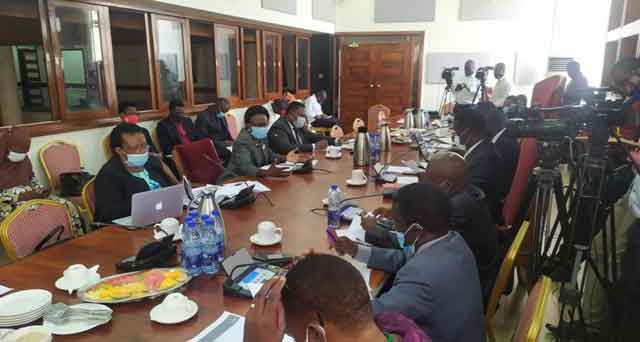
Kampala, Uganda | THE INDEPENDENT | The Ministry of Health has tabled before parliament a request of Shillings 20.5 billion meant to finance different strategies and critical areas by the Uganda Blood Transfusion Services (UBTS) to mitigate blood shortage in the country.
Led by the Minister of Health Dr. Jane Ruth Aceng before Parliament’s Health Committee, Dr. Dorothy Kyeyune Byabazaire, the UBTS Executive Director told legislators that they have recorded low blood collections due to the COVID-19 pandemic. She noted that they had collected only 56,850 units of blood from April 2020 to date against a target of 75,000 units of blood.
The UBTS is mandated to collect, store, process and issue blood to transfusing health facilities. Figures as seen by Uganda Radio Network-URN indicate that UBTS in April collected 14,768 units of blood, 23,032 units in May and 19,050 units in June against a target of 25,000 units in each month.
However, the Minister Dr. Aceng said that they had developed strategies for addressing the blood shortages during the pandemic and that the interventions are aimed to maintain the balance between reduced blood supply and hospital demand so that sufficient blood stocks are maintained to support ongoing critical needs like major trauma and maternal hemorrhage.
Now out of the required total supplementary budget of Shillings 20.5 billion, UBTS needs 234.8 million for the Call centre to enable calling up repeat donors for donation, 300 million for mobilizing donors at the village level, 375 million for awareness campaigns, 3 billion for transport of staff and blood collection, 10 billion for medical supplies and reagents, 493.4 million to facilitate blood collection in COVID-19 guidelines and others.
Another shillings 400 million is for motivation of donors, 1.12 billion to fill up vacant posts for blood collection and processing, 2.98 billion for blood supply management, 1.5 billion to help increase blood components production and others.
Dr. Aceng defended the budget saying that it is urgently needed to meet the increased cost of operations by the UBTS.
Tasked by Amuru Woman MP Lucy Akello whether UBTS did not receive funds from the recently approved supplementary budget for the Ministry of Health, Dr. Byabazaire said that they received Shillings 2 billion to procure reagents for testing blood, pay staff allowances and for fuel. Since the COVID-19 lockdown, the Ministry of Health has received two supplementary budgets. These include an earlier 119 billion supplementary and a recent 89 billion Shillings supplementary budget passed on 26th June.
Dr. Aceng told MPs that the COVID-19 pandemic lockdown has greatly affected the blood system activities worldwide and that Uganda has also not been spared.
Uganda registered its first COVID-19 positive case on March 21st and this prompted President Yoweri Kaguta Museveni to close all public places and transport services which restrictions also affected potential donors. UBTS then resorted to looking for blood donors and transporting them from home to donate blood at different blood centers. Uganda has currently registered 1,043 COVID-19 cases.
“Though the virus is preliminary transmitted by the respiratory route, it has the potential to reduce the supply of blood and adversely affect blood services activities. Since the arrival of the COVID-19 pandemic in Uganda, the Blood Safety program has not been spared and has had major implications for the program,” said Dr. Aceng.
Some of the highlighted implications posed by the pandemic are uncertain pattern of blood demands in hospitals, reduction in blood donation numbers, reduction in critical staff numbers due to lockdown restrictions, provision of new therapies such as use of alternatives to blood use and use of convalescent plasma for the treatment of COVID-19 patients and others.
Explaining the COVID-19 impact on blood donor mobilization, Dr. Aceng said that fewer blood donors have been reached through community based approach due to closure of schools, institutions of higher learning, churches, mosques, military training schools and others.
She also noted that traveling long distances to communities in search of blood donors has led to high operational costs and there has been increased cost to engage Community Resource Persons (CRPs) to mobilize blood donors and others.
In regard to the COVID-19 impact on collection of blood, the Minister said that there has been reduced blood donor population especially the first time donors who she said constitute a significant percentage 40% of donors.
Legislators also learnt that there have been reduced blood collection teams in all regions coupled with high operational costs since the UBTS had to include provision of PPEs for donors, staff and volunteers as well as revising the Standard Operating Procedures (SOPs) to include COVID-19 screening.
Parliament’s Health Committee Chairperson Micheal Bukenya said that they were going to present the required budget to Parliament’s Budget Committee for appropriate recommendation to the House.
*******
URN
 The Independent Uganda: You get the Truth we Pay the Price
The Independent Uganda: You get the Truth we Pay the Price





